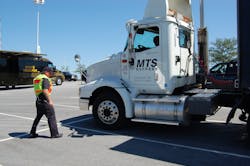CSA data could reflect outcomes of drivers’ citation challenges
One of the many gripes about data used in the Compliance, Safety, Accountability program has been that it reflects traffic citations issued against a driver even if the driver later challenges that citation successfully in court, but that’s changing.
The Federal Motor Carrier Safety Administration on Dec. 2 announced changes that would allow its Motor Carrier Management Information System to be updated by the results of adjudicated state citations. FMCSA plans to accept adjudicated results only for citations associated with and issued during a roadside inspection that occurs on or after the implementation date, but the agency is inviting comments by Jan. 2 on that issue.
FMCSA’s change is important because MCMIS data feeds FMCSA’s Safety Measurement System, which in turn forms the basis for motor carriers’ CSA scores, and the Pre-Employment Screening Program used by many carriers in driver hiring. SMS and PSP will reflect the results of adjudicated citations recorded in MCMIS, FMCSA confirmed.
“This is something that we as an organization have advocated for since the beginning of CSA,” said Sean Garney, manager of safety policy, for the American Trucking Assns. “It’s all about equity in the end, and it makes CSA a better tool in the long run. The accuracy of the data is imperative.”
Garney says that ATA appreciates FMCSA for listening to carriers’ concerns. “This is another example of the two of us working together.”
Currently, MCMIS doesn’t even contain a data field that would allow for adjudicated citations. FMCSA said it will modify both that system and SafetyNet – a database management system used by state agencies and FMCSA divisions to report inspection data – to accept data concerning a citation associated with a violation that (1) was dismissed or resulted in a finding of not guilty; (2) resulted in a conviction of a different or lesser charge; or (3) resulted in conviction of the original charge.
Although states presumably would be free to adopt procedures for routinely updating citations with adjudicated results, that is unlikely, and FMCSA is not asking for such a system. Rather, the agency plans to direct states to document adjudication results and supplement the initial inspection report when a driver or carrier files a request for data review in the DataQs system that is backed by appropriate documentation. So the burden will be on drivers and carriers to make sure the data is updated.
This change will not allow states to mask convictions by keeping them off drivers’ records if the driver submits to a diversion program, such as traffic school, FMCSA said. Federal regulations prohibit states from masking commercial driver’s license convictions through a deferral of judgment or diversion program.
“The agency views the practice of state courts dismissing citations after a guilty plea has been entered or following payment of a fine or mandatory contribution to a state program as a condition of dismissal, as ‘masking’ of a commercial driver's violation of state or local traffic control laws,” FMCSA said in its notice.
One benefit of using adjudicated convictions is that it will be easier for FMCSA and state licensing agencies to track and document patterns and practices that violate the anti-masking rules, the agency said. States found to have used masking or other diversionary programs risk decertification of their CDL programs, which could impact grant funding.
FMCSA said its preliminary decision not to allow adjudication updates on prior citations was based on the potential workload states could face if they had to process thousands of past adjudicated citations through the DataQs system. That burden, in turn, could delay the processing of other DatasQs requests or even require states to redirect scarce resources from roadside enforcement to DataQs processing.
